Pessimists predict that technological advances will benefit corporations, not workers. The way they see it, robotization in the manufacturing and service sectors will allow companies to lay off people and destroy jobs en masse. I believe artificial intelligence (AI) will create an abundance of new jobs, positions and professional roles.
As robotization spreads far and wide, even the most advanced machines will still be defect prone. They will require software updates, and parts and equipment that will have to be manufactured and fitted. Therefore, sooner or later, a great number of robot specialists, who today do not make up even one percent of the workforce, will have to enter the labor market. Certain industries stand to benefit from this process sooner than others; the automotive industry, transport, logistics, electronics, robotics, and renewables. New manufacturers, engineers, maintenance experts and professionals, equipped with novel skills will join the labor force in great numbers, finding jobs in new companies. Studies show that for every robot brought into use, an average of three new jobs will be created.
So, call me a realistic optimist.
A modest proposal: The robot tax
As I reviewed the literature on how the labor market may be affected by automation and robotization, I came across an intriguing suggestion by the journalist Ben Tarnoff in The Guardian, “Robots won’t just take our jobs – they’ll make the rich even richer.” Despite the headline, the author is not downbeat about the future. He identifies solutions for mitigating the downsides of robotization, while allowing that new technologies, which may foster substantial societal growth, will also entail threats unless politicians and economists adopt adequate regulations. Critics of today’s technologies forget that no change – especially the kind of change that affects entire job markets – can be undertaken without putting in place proper regulatory and legislative mechanisms. That the technological revolution requires legislative support should be obvious.
Without a political remedy, one dire possible future described by Tarnoff imagines the professional and social death of many groups. As technologies are perfected, and human labor accounts for an ever-lower share of the cost of capital creation, companies earn more money, but the benefits do not trickle down to the worker. Rising profits resulting from greater efficiencies are pocketed by investors and business owners without corresponding increases in wages, training, or employee growth opportunities. This process leads to the wealthy isolating themselves in luxurious guarded enclaves, leaving the jobless members of the lower and middle classes to radical resorts, including violent ones. In this bleak scenario, technology becomes a political shaper of dystopia. Is there a political instrument that could prevent this apocalyptic scenario from emerging? Tarnoff believes a robot tax could raise enough revenue to retrain displaced workers and/or supply them with basic income. This is a conclusion arrived at by EU politicians in France, as well as Bill Gates.
Now, some bad news
According to some studies, there is a 50% chance that the devices and machines that rely on artificial intelligence will be able to perform allhuman jobs within the next 45 years, and that every job will be automated within 120 years. Oxford University Professor Michael Osbourne, who specializes in machine learning, believes that machines will replace roughly 47% of our jobs in the next two decades, leaving half the population with nothing to do. In the United States, automation will destroy an estimated 9.1 million jobs by 2025. The estimated number of jobs that potentially may be eliminated in Japan is 55%, 52% in India, 51% in China and 46% in the United States.
In my view, these numbers are still too low.
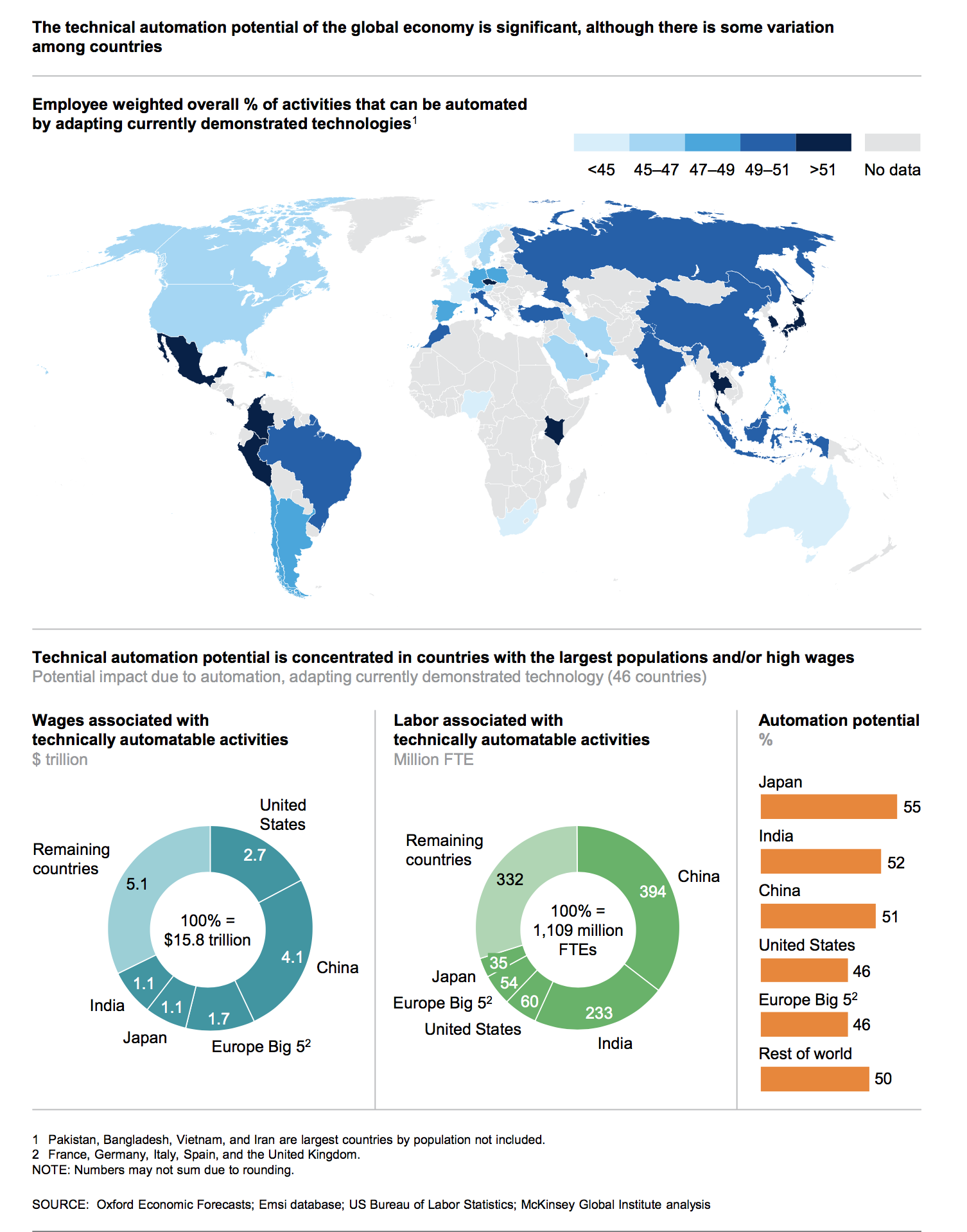
Picture 1: Technical automation potential of a global economy varies among countries. Source: McKinsey Global Institute
Of course, discussing the labor market demands a broader perspective to account for the nature of the work performed, worker education, and other factors. That all matters. The data below make it clear that the negative effects of robotization and automation will be felt unequally by profession. Drivers, for example, should worry, given the rapid advances in autonomous vehicle technology. On the other hand, doctors, lawyers and teachers will probably be safe. Indeed, jobs where human interactions, creativity and emotional intelligence matter should not be endangered. Technology may, in fact, offer these professionals tremendous opportunities to enhance their performance.
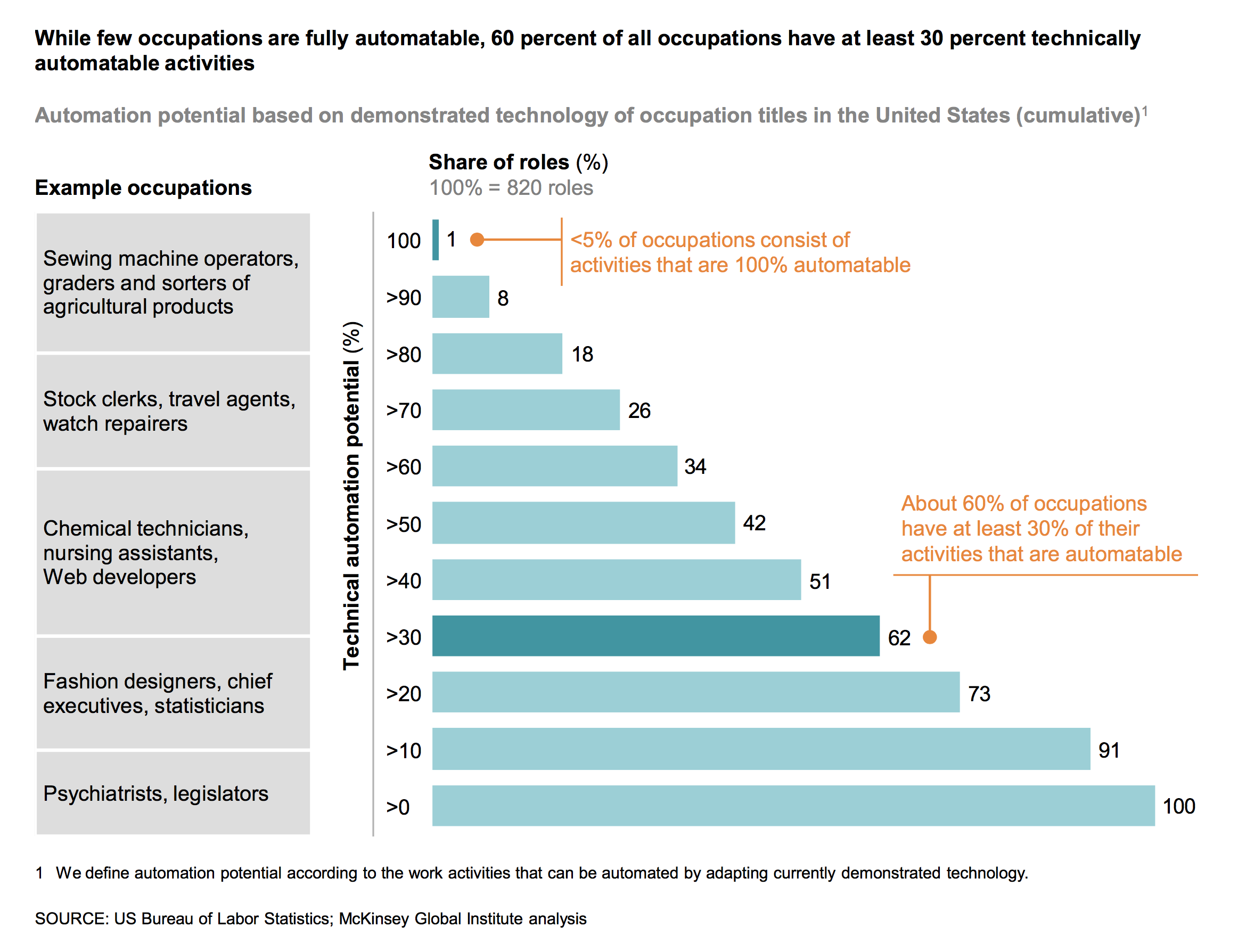
Picture 2: 60% of all occupations have at least 30% technically automatable activities. Source: McKinsey Global Institute
The learning machine must be taught
As robotization advances, demand for new technical skills is bound to grow. A very interesting category of new professionals will be trainers responsible for teaching entire AI systems. These professionals will combine the competencies of programmers, psychologists and coaches. Even today, Google employs specialists whose main responsibility is to teach algorithm-based devices to work faster and more efficiently. Such trainers will work with algorithms and neural networks to ensure that they understand and mimic human behavior ever better. Chatbots, i.e. tools posed to dominate the customer service industry, must be trained to interact with humans to make communication natural. That means covering a whole range of behaviors, including human emotions. Algorithms need to be trained to respond appropriately to complications in human lives. For example, if I lose some documents in a robot-run hotel in the middle of nowhere, the first interaction I am going to have will probably be with a chatbot or a physical robot behind the front desk. Its job won’t be just to find my documents; it will be to calm me down, examine the facts, guide me, support me psychologically and refer me to whoever can solve my problem. Interactions with machines are going to be our future. Special trainers will be needed to ensure such interactions are not devoid of human emotions. These trainers will also be employed by corporations producing personal assistants such as Amazon’s Alexa who asks us about our health and how we feel. And, by the way, all this raises doubts about the claim that machines will never be able to experience human emotions and feelings. But that deserves a separate article.
Ethicists of a new era
Since early last year, the European Union has been preparing regulations designed to keep consumers safe from the undesirable actions of AI. The new laws (which may take effect this year), are intended to create rules to protect people harmed by devices that rely exclusively on algorithms. The new legislation will also regulate how our personal data may be made available to machines. And, by the way, this development will create demand for new competencies and new jobs. People will be tasked with monitoring chatbot-generated content and robot performance. New ethicists will thus check applications and machines for possible legal complications. They are likely to be in high demand in telecommunications and automated customer support. Even today, ethicists are being hired by Google (a special DeepMind Ethics and Society unit has been set up in London to address a wide range of ethical issues associated with AI). Ethicists will be needed by all companies that rely on robots, bots or virtual assistants to make their products or render their services.
Feeding the machines
All artificial intelligence relies on processing massive amounts of data. Those data need to be delivered to the machines. Facial-recognition devices, for instance, rely on large collections of photographs. One future job will involve gathering data and feeding them to machines and other devices that require large and varied data sets. The demand for data feeders may give rise to a whole new industry that will create jobs in great numbers.
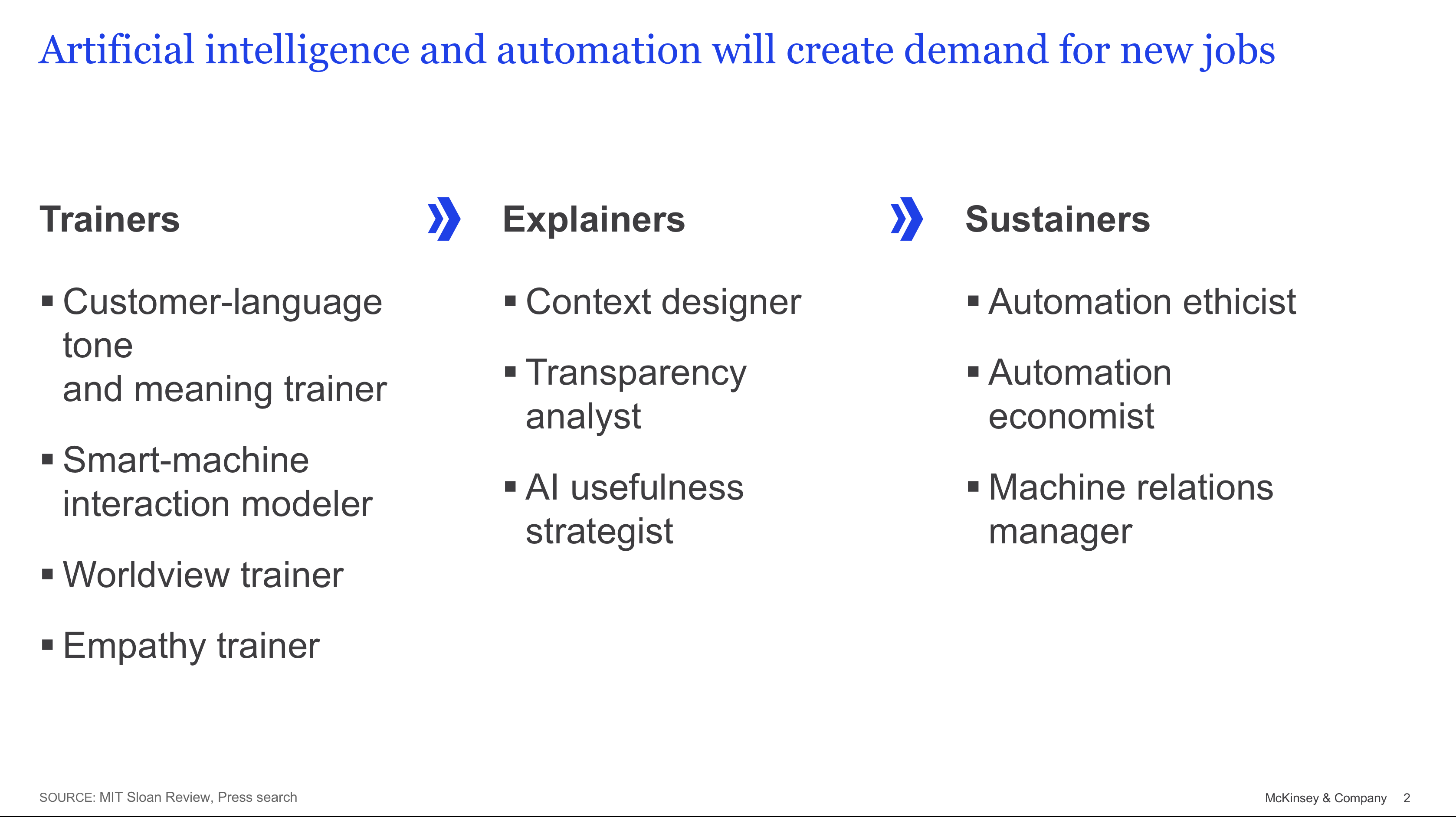
Picture 3: Artificial Intelligence and automation will create demand for new jobs. Source: McKinsey analysis
Technology changes everything
While I have only offered a few examples, I am confident there is going to be no limit to the demand for new specialists.
The voyage toward artificial intelligence is complex. To say that the automation of business processes will inevitably disrupt public order is to argue the obvious, but that’s only half the story. Clearly, claiming that for every job lost to a robot three will be gained ignores the fact that those three will not be suitable for all the workers displaced. What is certain, however, is that AI will create opportunities for millions of people, liberating them from rote work, motivating them to acquire new knowledge, inspiring them to take on new intellectual challenges and enabling them to learn new things. A new technology that helps advance evolution is neither good nor evil; the potential for both is always there. Which way it goes is up to us.
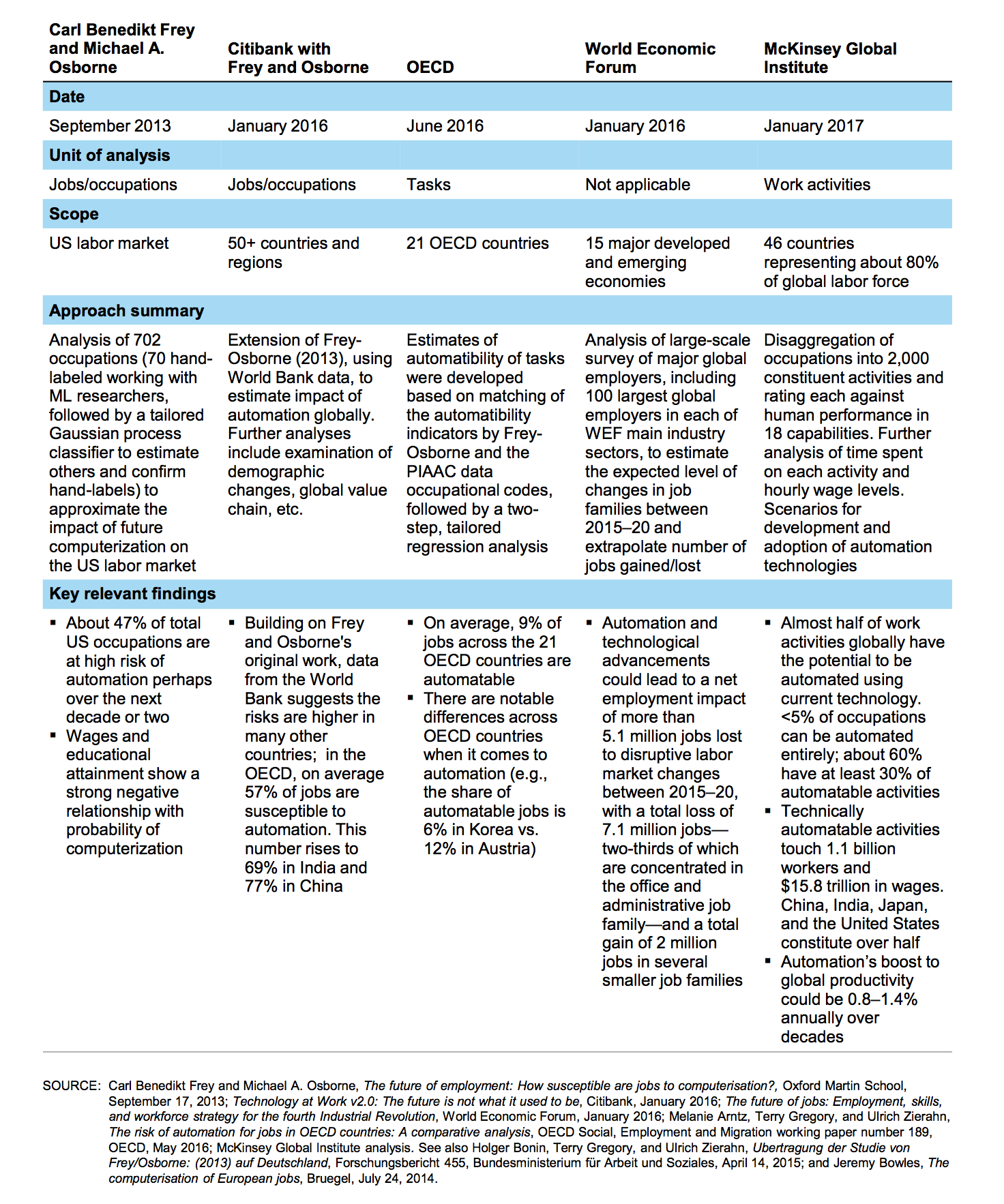
Picture 4: Recently published reports key findings on the impact of automation and artificial intelligence on the jobs market. Source: individual reports
Related articles:
– Looking for greater profits? Start sharing with me
– Will a basic income guarantee be necessary when machines take our jobs?
– Can machines tell right from wrong?
– The lasting marriage of technology and human nature


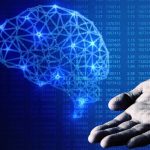
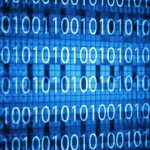
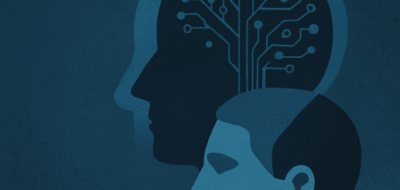


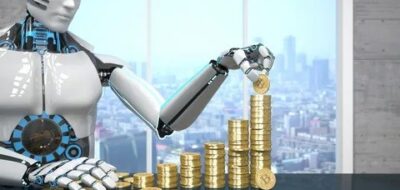


Acula
1. Well despite progress in AI it is still quite stupid. And we hard time make it more intelligent that say, a worm. This is because expanding resources available to AI (a trick that worked for regular computers) tends to make AI more stupid rather than more intelligent as having such capability it tends to memorize instead of generalizing. Hence creating complicated AI systems capable of thought seems to be well ahead of us.
2. The future is just an illusion in physics. This is just one possible way of ordering events. And not particularly remarkable one – outside of the way ur mind operates – that we can remember the past but cannot remember the future.
SimonMcD
When you speak to philosophers, they act as if these systems will have moral agency. At some level a toaster is autonomous. You can task it to toast your bread and walk away. It doesn’t keep asking you, ‘Should I stop? Should I stop?’ That’s the kind of autonomy we’re talking about.
TomK
Good article!
The essence is thought and knowledge.
Getting to know more about ourselves, we pass on this knowledge to AI.
Nano info, neuro-trakers, noosphere, Beasts mediate in acquiring and implementing knowledge.
Norbert Biedrzycki
Adam Spikey
Customer service support is not the one of most desired jobs. So this trend is a must to keep the operations going on in a digital world.
Acula
Indeed. In the expanding world of the Internet of Things, entrepreneurs would be better off to remember two old adages: Resistance is futile, and if you can’t beat them join them. No matter its predicted benefit, the notion of change is hard to accept because people are settled into comfort zones and face resistance based on the status quo. Profiting from your information might be the best selling point. After all, everyone else will benefit from your data. Why not you?
Check Batin
A basic income guarantee is a system that regularly provides each citizen with a sum of money. Except for citizenship, a basic income is entirely unconditional. A basic income guarantee would radically simplify the welfare state, and truly ensure that no one has to live in poverty. Its necessity will become increasingly obvious as more human labor is replaced by machines.
Tom Jonezz
Evolution gave us the brain which has given us technologies such as flint tools, the wheel, and clothing that enabled us to extend ourselves past our biological limitations. Is an artificial eye any different? Are we any less human for using an arrow to kill a deer rather than our bare hands? Who gets to decide?
Some critics argue that the two positions transhumanists propose, rejecting human enhancement through augmentation and implants entirely or wholeheartedly embracing everything the transhumanist movement represents is a false dichotomy.
Tom299
In this worldview, creative works like a great novel or symphony, and the emotions they evoke, cannot be reduced to lines of code. Humans retain a dimension of superiority over algorithms.
Norbert Biedrzycki
Forecasted cumulative worldwide Artificial Intelligence revenue 2016-2025 (USD)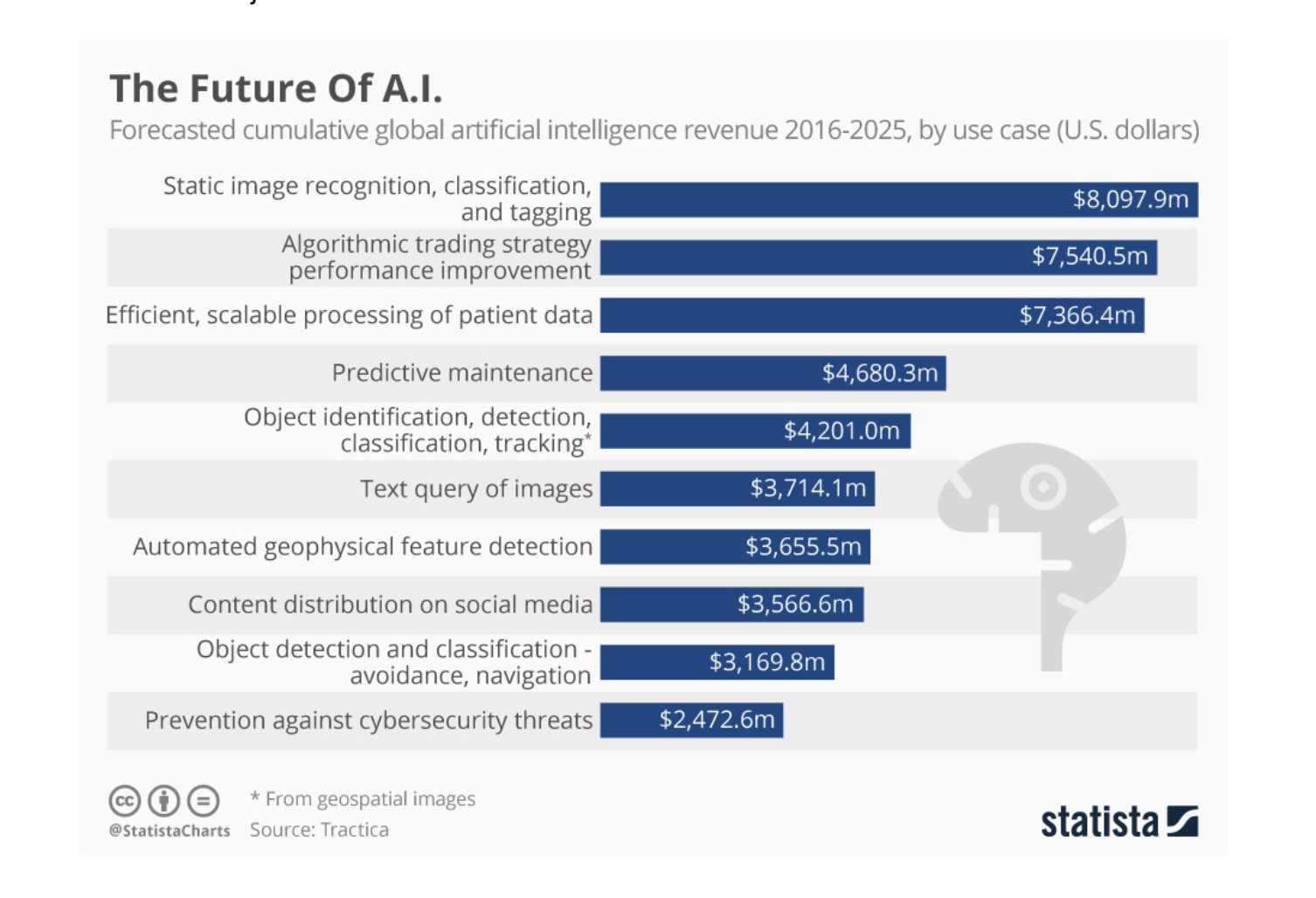
And99rew
Just do not hinder society by regulations. Cut taxes, cut government spending and gov jobs. Abolish privileges for banks and corporations. And laissez-faire. Always works 🙂 Humans are flexible.
Mac McFisher
Robotic process automation covering more and more rules based tasks is inevitable and you are right that it may bring unexpected side effects like creating more jobs or increasing creativity of those released from boring tasks ..:)
Jack666
Automation looks interesting Norbert, look forward to hearing more about it.
Simon GEE
I believe an advanced neural network, possibly a quantum brain, could simulate a self aware being.
ZoraBora
Robotic process automation covering more and more rules based tasks is inevitable and you are right that it may bring unexpected side effects like creating more jobs or increasing creativity of those released from boring tasks ..:)
Norbert Biedrzycki
Acula
As Prof. Frick says in The Simpsons episode “There Will Be Buds”, “Uh, well, Kent, these children will need their brains unbruised for the demanding, high-tech jobs of the future: polishing and buffing our robot masters.”
TomK
Bot vs Bob – a place without humans?
Adam Spikey
If you are self obsessed, this would seem the perfect inward facing goal! Oh, and because there isn’t anything real about “consciousness” or “soul” you can claim success at any moment convenient to you.
Norbert Biedrzycki
How can you write an algorithm for something that is not fully understood? I would say that not until consciousness and idea or concept of soul is clearly defined can you ever begin to create artificial intelligence.
John McLean
Environmental biofeedback is way more complex than a set of coded instructions …
Software can be self-referential but that do not implies that it by itself can deploy human like sentience.
Because, human sentience is an integrated environmental process where the hardware is – too – the software (some authors like to call that: Wetware )
Of course, Machines can deploy identity, but not to “feel what is to be a human” … ( for that, the machines must to emulate a complete universe from quantum scales…
Norbert Biedrzycki
What “consciousness” and “soul” are is words that make scared and lonely people feel less scared and lonely. That’s all they are.
SimonMcD
Some experts say it could take anywhere from five to thirty years to develop autonomous weapons systems, but others would argue that these weapons already exist. They don’t necessarily look like androids with guns, though. The recently tested X-47B is one of the most advanced unmanned drones in the US military. It takes off, flies, and lands on a carrier with minimal input from its remote pilot. The Harpy drone, built by Israel and sold to other nations, autonomously flies to a patrol area, circles until it detects an enemy radar signal, and then fires at the source. Meanwhile, defense systems like the US Phalanx and the Israeli Iron Dome automatically shoot down incoming missiles, which leaves no time for human intervention.
Tesla29
I share your hope, but in a different way.
Humanity has gone through a similar transition – from agrarian to industrial. But the jobs created were not mechanics for farm machines, but using industrialization to solve problems on a new scale.
Similarly, I don’t see the new jobs coming from robot-caretaking, but from utilizing robots and AI to solve the problems that matter to each of us.
And championing those solutions, utilizing robots and AI, will be the new job market of the future.
So the new jobs won’t be in building the robots, but in using them – just as computers took over some jobs, they created new industries of computer use.
Karel Doomm2
We are not in a position to determine what is a human in the future. I think it is fascinating that we can press the boundaries of what science will allow scientists to build. without any regard what this means to humanity and the real life consequences. The danger of this recipe at hand is the following: 1) scientists/technologists have been given free reign on defining the future of humanity; 2) companies that do not want to be regulated writing papers to influence politicians that are unaware of steering policy. I think if you put some of these scientists/technologists/politicians in a room with Mohammed, Jesus, Moses, Buddha, and other religious leaders they may leave the room thinking differently. These companies can stand outside of their corporate facilities smiling and showing what great things they are doing for humanity well we should have a governance committee backed by international laws determine if that is the case.
Two videos that are helpful as we think about advocating for governance and law:
Ronald Dworkin -Law: https://lnkd.in/eSn4_c3
Murray Gell-Mann- Science/Tehnology: https://lnkd.in/ezfT_ZD
Tom299
This leaves us free to spend more time on the rewarding aspects of our work, pursuing creative hobbies, spending time with loved ones, and generally being human.
In this worldview, creative works like a great novel or symphony, and the emotions they evoke, cannot be reduced to lines of code. Humans retain a dimension of superiority over algorithms.
And99rew
I’m pretty sure that the ratio between job lossed to automation and jobs created by automation is not 1:1. I would respectfully suggest that the losses will significantly outpace the creations.
Karel Doomm2
Very valid point
CaffD
I don’t pretend to have the answers to thequestions, whatever they are. To be honest? I find what your statements pretentious and confused. I feel no need to “win the argument” 🙂
PiotrPawlow
very interesting
CaffD
Great article
johnbuzz3
I’m sensing you’d prefer a threshold theory, one in which intelligence is a walled territory of dynamics that starts at a particular quantity or quality of behavior. Usually when people subscribe to threshold definitions of intelligence who’s boundaries are near or equal to human measures.
Tom Jonezz
“Now that we have a definition of intelligence” well, THAT was impressive LOL
Check Batin
Intelligence too is a cline, not a bounded category. Every structure is intelligent in that it predicts (causes) some futures more than it predicts (causes) other futures. Now that we have a deffiniton of intelligence and one that is not domain or scale dependent, and one that is also parameterized by a gates and wires network theory of computation
AdaZombie
like always to the point. Thanks for a great article
Tom299
Technology is not the core of digital transformation. I think this counter-intuitive “truth” is one of the things that most people are passing over. While, for many of us, the development of the technology is a mystery, the fact that it appears so simply and regularly in our lives has made it the most easy to accept (and it is something that we, personally, do not have to do much about as it just show up). But truly trying to change a culture, starting with how we act and think differently? Well, that is incredibly difficult and humbling. And, so, often avoided actively. I appreciate your insights. All the best
Adam Spark Two
All AI is is an abstraction or map of another system. If navigating said map is less expensive than navigating the system it maps, it is said to be intelligent.
CaffD
Come on, show your alternative hypothesis. Present a reasoned coherent critique that falsifies my definition of intelligence as any system of prediction.
CaffD
… waiting
Jack666
Good read. Lots of good data
Simon GEE
Could someone just explain the difference between a decision tree rule system and a Nueral Net? 😂
Norbert Biedrzycki
The difference is vast. Rule-based systems are examples of “old style” AI, which uses rules prepared by humans. Neural networks are examples of “new style” AI, whose mechanism is “learned” by the computer using sophisticated algorithms, and as a result, we humans don’t really understand why it works. While in some cases rule-based systems could be effective, the general trend in AI has been to switch to machine-learning algorithms such as neural networks, due to their much better performance.
Rule-based systems and Artificial Neural Networks are just some of the different algorithms/models that are being used. Other popular approaches are Support Vector Machines, decision trees, ensemble methods, probabilistic graphical models, and there are many others.
Oscar2
Taking into consideration that AI solutions (ie neural networks, genetic algorithms, machine learning, etc.) can be represented using computer programs (written in C, Java, etc.). Computer programs to be started on the computer have to be translated to the machine code where the main control instructions are simple conditional instructions and jump instructions, so we can say that “AI is nothing but a bunch of “if…else” statements”… 🙂
Jack666
Every logic is combination of IF – ELSE
Mac McFisher
Remember that all decisions are if then else. All causal interactions are the same. Every change is the result of a binary or rather, series of binary interactions. This is true no matter how complex a system or its interactions with other systems or with itself. If change is possible it’s because there are at least two possible results. The conditions that bracket such events are at this level of examination completely irrelevant.
TomK
God great there are people here with the cognitive chops to have a productive conversation on this topic.
TomCat
Please if you don’t believe that intelligence is synonymous with prediction, please do offer a reasoned robust critique and or an alternative definition.
Adam Spikey
your brain could have the very same function with if else expression.
AdaZombie
Easy…
AndrewJo
Well people who actually know a subject and are willing to teach what they know sure are annoying. Knowledge has a way of getting in the way of delusions and we can’t have any of that!
SimonMcD
Yes, and all life is a pile of chemicals. Want to argue that ? Next oversimplification?
Check Batin
Now can we talk about what “intelligence” means? Intelligence too is a cline, not a bounded category. Every structure is intelligent in that it predicts (causes) some futures more than it predicts (causes) other futures. Now that we have a deffiniton of intelligence and one that is not domain or scale dependent, and one that is also parameterized by a gates and wires network theory of computation, we can ask practical questions such as “How does one build the most efficient and powerful intelligent…
John McLean
Humans are nothing but a bunch of atoms.
John Accural
Once you define the foundational architecture, the bounds and limits can be formally abstracted. That is the most important aspect of any domain of science. Once you define the base as logic gates, you have accepted that the only thing that matters between those gates is discrete data channels (insulated wires for example). How those channels operate or of what they are made or what functions as data (is passed down them) or how fast or how far apart… well those become incidental factors, qualitatively…
Karel Doomm2
’ll go one further and say that all systems respond to changes in their environments (learn) and that learning is all that intelligence is, and that intelligence is only selectively fit if it makes better predictions than the predictions from the structures that it competes against and that no qualitative differences separate some predictions from others, and that there is therefor no difference between bio and any other form of intelligence and or evolution.
TomHarber
What if AI is a buch of “what..if’s”?
then:
WHERE f(A) = B
A = A large matrix of numbers, usually between 0 and 1
B = A smaller matrix of numbers
B = f(A)
if B[0] > C then ‘cat’
if B[1] > C then ‘dog’
Really, when you boil it down the basics its
a series of additions, subtractions multiplications, comparisons and logical operations like AND, OR or XOR.
TommyG
Quite good. Just to add. Machine learning will be used only if you have a vast amount of tries or have a large amount of historical data and best both of these
Tesla29
Robotic process automation covering more and more rules based tasks is inevitable and you are right that it may bring unexpected side effects like creating more jobs or increasing creativity of those released from boring tasks ..:)
TomaszK1
Your brain is architecturally parallel. If else is a sequential concept.
AndrewJo
Everyone is behind its mobile device and interaction happening. Mane a robot will help change that as we are so obsessed with devises that chatting to a robot will become the new norm of interaction…
PiotrPawlow
Too many people in the world to need work to see automation as a solution.
Much as I love the technology.
Adam T
Interesting data. Thanks for sharing
johnbuzz3
I share your hope, but in a different way.
Humanity has gone through a similar transition – from agrarian to industrial. But the jobs created were not mechanics for farm machines, but using industrialization to solve problems on a new scale.
Similarly, I don’t see the new jobs coming from robot-caretaking, but from utilizing robots and AI to solve the problems that matter to each of us.
And championing those solutions, utilizing robots and AI, will be the new job market of the future.
So the new jobs…
TomCat
I’m pretty sure that the ratio between job lossed to automation and jobs created by automation is not 1:1. I would respectfully suggest that the losses will significantly outpace the creations.
Check Batin
Linking the brain to a cloud for common access to the intellectual achievements of all people will long remain unfeasible. One cannot be sure of being on track to “meta-intelligence”
Check Batin
How about taking the middle ground? Some jobs are lost and some new ones appear. Theres going to be a shift in the marketspace, which will benefit some and hurt others.
John Accural
Probability will suffice for this problem, machine learning will be used only if you have an unlimited amount of tries or have a large amount of historical data
AdaZombie
Machines will replace humans in performing the most repetitive jobs. However, this expected robotization and automation of repetitive processes will not be the only or even the most important change that we are likely to see in the future labor market. What will work be like in the future?
Tom299
What may soon be a routine set of activities and technical operations remains beyond our grasp, actually appearing to be fantasy. For sue. The incorporation of such processes into everyday life will have a tremendous impact on the human condition. Are we going to stay humans as we know?
Tom Jonezz
I suggest that AI’s impact on some of the traditionally blue collar industries (although many are no longer blue collar) named above (such as automotive) will likely be less than many white collar, professional industries, like Medicine and Law.
Welcome the days when you can get a doctors appointment without notice or have your Conveyancing done by in a competent manner at a reasonable cost with any degree of confidence.
There are many layers of meanial work…
Simon GEE
Right. Could someone just explain the difference between a decision tree rule system and a Nueral Net? Please
Norbert Biedrzycki
The difference is vast. Rule-based systems are examples of “old style” AI, which uses rules prepared by humans. Neural networks are examples of “new style” AI, whose mechanism is “learned” by the computer using sophisticated algorithms, and as a result, we humans don’t really understand why it works. While in some cases rule-based systems could be effective, the general trend in AI has been to switch to machine-learning algorithms such as neural networks, due to their much better performance.
Adam Spark Two
Main goal would be to increase our memory capacity and strengthen our cognitive functions to unimaginable boundaries. In fact, we would have the opportunity to connect with other human brains as we can today communicate with computers or phones belonging to other people. Thus, we would have a direct insight into all the content created in our entire human history and to the content that is created on an ongoing basis in the intellectual process.
Grzegorz Wiatr
Overall good piece
Norbert Biedrzycki
Thank you
Grzegorz Wiatr
Valid point. Re-qualification is an important mechanism to aid the transition from more to less automatable jobs. Important not to dismiss the importance of providing retraining and social protection for young workers and those in low-skilled jobs.
Simon GEE
So what? What would be the future?
Jack666
Another great piece. All the best
Norbert Biedrzycki
Thank you
TomaszK1
Really enjoyed this article and the holistic view on the challenges with adoption of AI.
In my view, the same issue that permeates the AI can be said about any technology being hyped right now, such as Block Chain or ML. The issue becomes that the technology itself becomes bigger than the problem or benefit it’s supposedly offering.
The same issue keeps popping up, what is it that we’re trying to accomplish, in an effective manner. If the proposed solution isn’t efficient, productive or effective vs the CURRENT environment, there is never going to be a tipping point toward mass adoption.
TomaszK1
Your brain is architecturally parallel